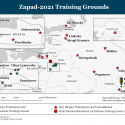Recent Iranian Proxy Attack in Iraqi Kurdistan Unlikely a Signal for New Escalation
Sep 17, 2021 - Katherine Lawlor
The recent Iranian proxy drone attack on Erbil International Airport was likely a stand-alone event and likely does not indicate the immediate resumption of large-scale Iranian proxy attacks on US facilities in Iraq. Iranian proxy militants launched two drones targeting what Iran assessed to be an Israeli intelligence asset at Erbil International Airport in Iraqi Kurdistan on September 11, 2021, possibly triggering an Israeli retaliatory strike on a proxy convoy in Abu Kamal, Syria, on September 14. Iran may have approved this attack after US and Israeli political and military leaders met in recent weeks to discuss their strategies for addressing the threat Iran poses to US, Israeli, and regional security. The 20th anniversary of the 9/11 New York terrorist attacks may have influenced the timing of the attack. Iran will likely maintain its ban on large-scale attacks on US facilities in Iraq until after Iraq’s October 10 elections and possibly until the end of 2021 unless the Iran-Israel escalation cycle spills further into Iraq.




